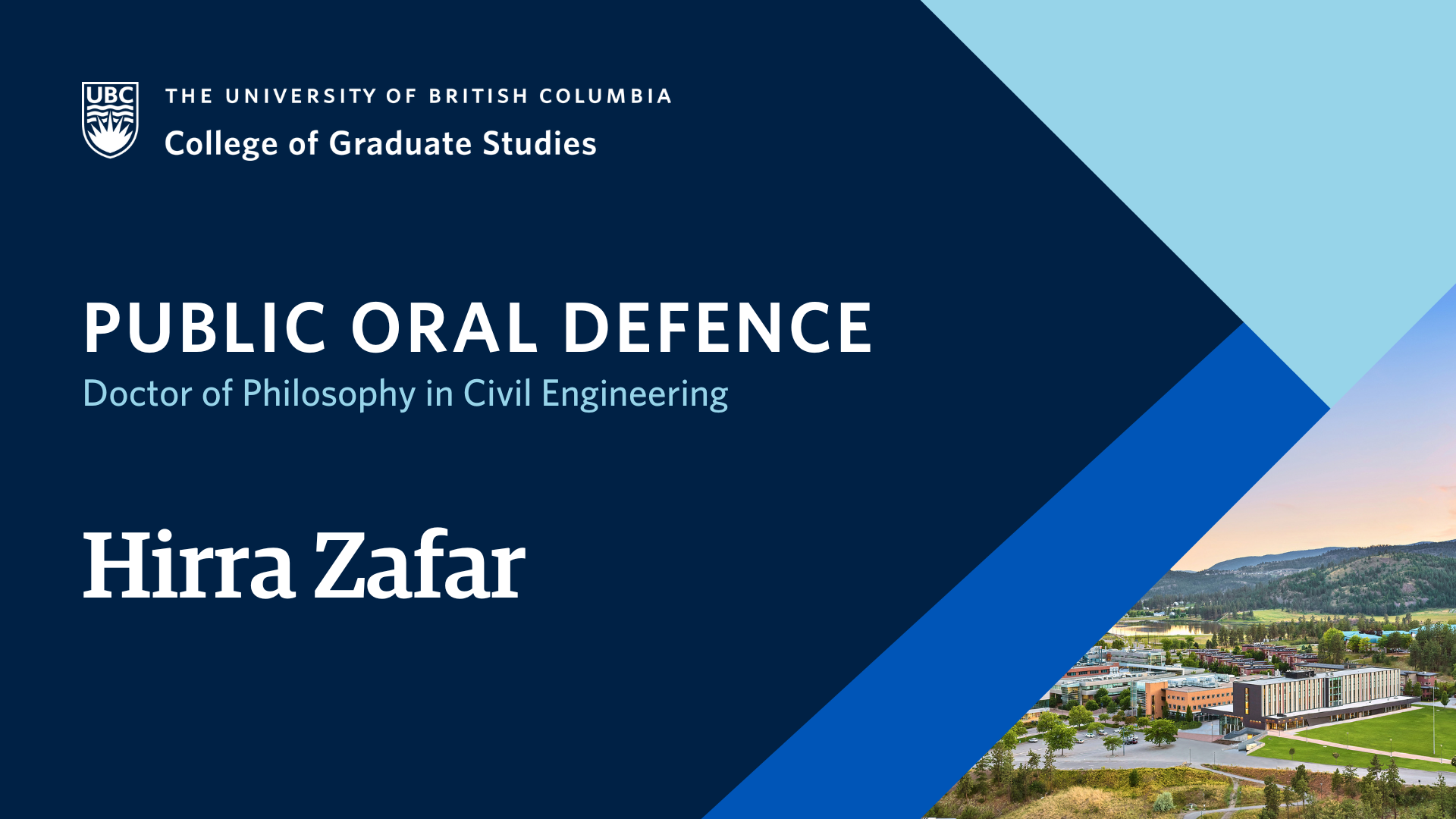
- This event has passed.
Doctoral Examination: Microbial fuel cells: A comparative analysis of operational factors, response metrics, and degradation response to fruit waste degradation
March 17, 2023 at 3:30 pm - 7:30 pm

Hirra Zafar, supervised by Dr. Nicolas Peleato, will defend their dissertation titled “Microbial fuel cells: A comparative analysis of operational factors, response metrics, and degradation response to fruit waste degradation” in partial fulfillment of the requirements for the degree of Doctor of Philosophy in Civil Engineering.
An abstract for Zafar’s dissertation is included below.
Defences are open to all members of the campus community as well as the general public.
To access a zoom link to attend this defence please contact the supervisor at nicolas.peleato@ubc.ca.
ABSTRACT
Food waste generation is increasing due to a rise in the global population and their ever-increasing demands. If not appropriately treated, food waste can harm human health and the environment in many ways. Microbial fuel cells (MFCs) are bioelectrochemical systems with a great potential to oxidize organic matter present in food waste with simultaneous electricity generation. Previous MFC research has focused on treating simple wastewaters and improving power output. A limited amount of work has been done using solid feedstocks, with generally low reported performance. Our limited understanding of how various factors affect MFC performance in a solid phase system forms a bottleneck in optimizing MFC for a commercial application. The goal of the present study was to solve challenges when treating solid fruit waste in MFCs using soft techniques such as meta-analysis and experimentally using lab-scale MFC prototypes.
A systematic review (meta-analysis) of MFC studies highlighted the critical associations between MFC influence factors and response metrics. Results indicated that single chamber/air-cathode and dual chamber/aqueous phase cathode MFCs are the most commonly used configurations. However, dual-chamber MFCs achieved 18% higher COD removal and 73% higher coulombic efficiencies than single-chamber MFCs. MFCs using a solid operating phase achieved ˃38% higher coulombic efficiencies than those using a liquid operating phase. The outcome of the meta-analysis was used to develop MFC on a lab scale and to address the challenges of a solid phase MFC for further study.
A comparative analysis of the MFC design and operating phase was carried out on a lab scale by developing a two-stage anaerobic up-flow leachate reactor MFC (AULRMFC) and a single-stage MFC (SSMFC). The findings revealed that an AULRMFC with substrate recirculation successfully achieved 95% higher total solids removal in 30 days compared to SSMFC. Althoughslow kinetic rates were noticed in the case of SSMFC, the coulombic efficiency achieved was 86.7% higher than AULRMFC.
The fruit waste degradation in MFC was also evaluated employing bioaugmentation with carbohydrate-degrading strains Bacillus subtilis and Cellulomonas fimi. The results demonstrated that adding Cellulomonas fimi alone resulted in the highest cellulose removal of 2,759 mg/L cellulose in two days. The addition of both Cellulomonas fimi and Bacillus subtilis achieved the highest total solids removal and total volatile solids removal of 82% and 84%, respectively.
A seasonality study was conducted to analyze the influence of feedstock change on MFC efficiency. Analysis showed no drastic change when the substrate was switched from apple to peach; however, a 91% and 119% decline in COD removal efficiency and power density, respectively, was noticed when the feedstock was changed to cherry slurry. The decrease in power density and COD removal efficiency was attributed to the high internal resistance posed by cherry pits and the possible release of toxic cyanide in the anode chamber. The outcome of the present study revealed new information about MFCs that provides a clear pathway for future research in this field. Moreover, the findings will help MFC managers seek solutions for developing and optimizing MFC on a commercial scale.